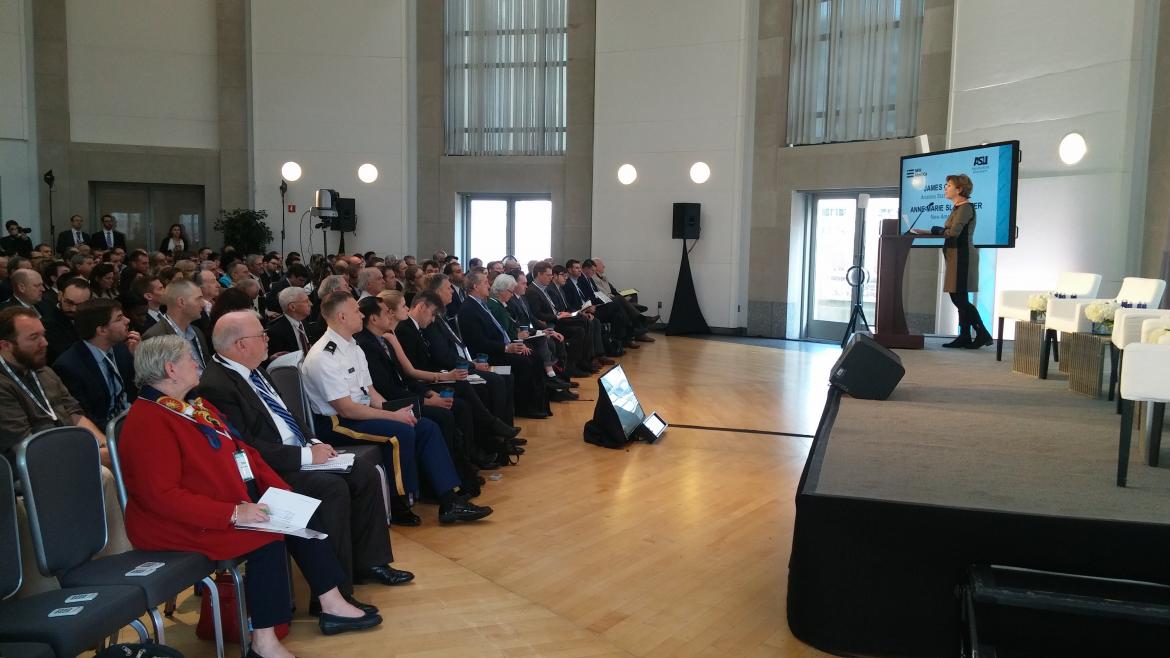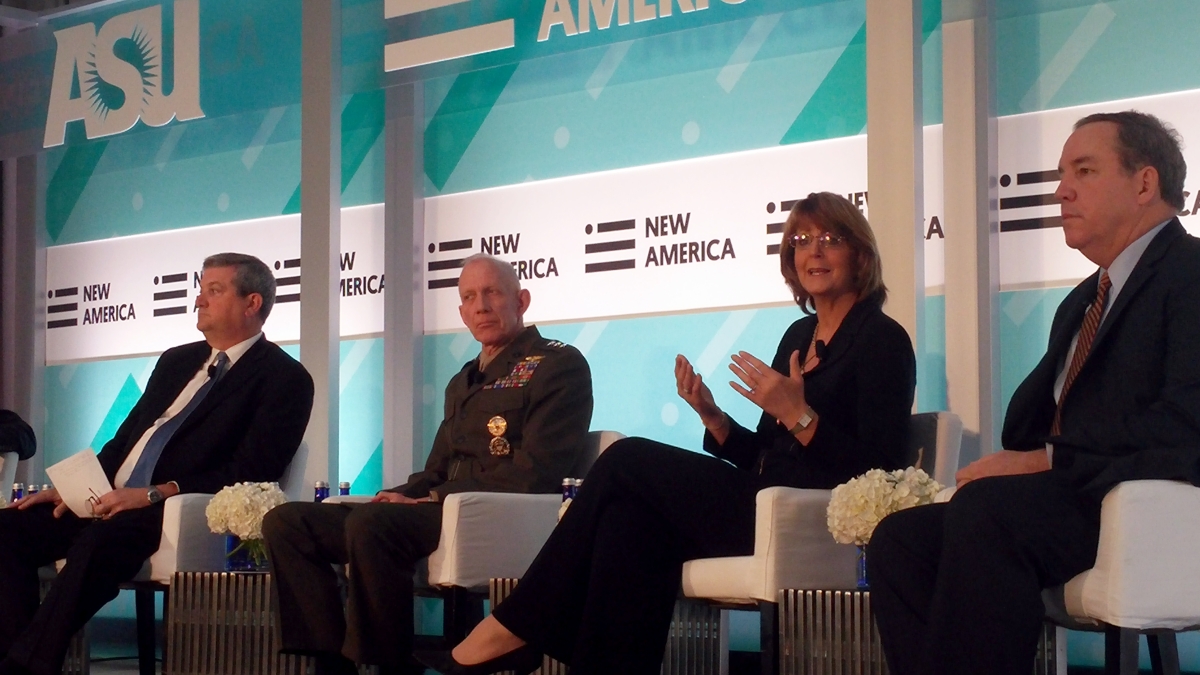WASHINGTON — Former Air Force Maj. Gen. Margaret H. Woodward, an Arizona State University alumna, led the initial air campaign when the United States intervened in Libya in 2011. She also watched later as that country deteriorated into chaos.
The problem, she said: No clear national strategy.
"We took the tactical tasks that we were given and we asked for more strategic guidance but that wasn't really forthcoming," Woodward said Thursday. "In the absence of that, the military will always fill in the gap. So we did what we needed to do."
Woodward and fellow members of ASU’s Flag Officer Advisory Council propose modernizing the National Security Act of 1947 to shift the nation away from turning to the military to solve all crises, a proposal they highlighted at Thursday’s Future of War Conference, in Washington, D.C., organized by ASU and New America.
The council urges reforming the National Security Council, situated in the executive branch, and empowering it to act as a quarterback would organize the muscle of a $4 trillion government, an army of nonprofits, the brainpower of universities, the engine of the private sector and networks of state and local governments that are now left untapped or underutilized in crises. The National Security Council needs the authority to weave in organizations to create a strategic, whole-of-government approach to help the nation better deal with future challenges, such as Libya, the council argues.
The Flag Officer Advisory Council, consisting of active duty and retired generals and admirals from the U.S. Army, Navy, Air Force and Marine Corps, advises ASU President Michal Crow on national issues. They captured their concept in a proposal released Thursday.
They call for exercising three key concepts: strategic vision, whole-of-government solutions and whole-of-society solutions.
“In our paper we are calling for a return to strategic vision and getting back to articulating strategic end states by the National Command Authority,” said former Army Lt. Gen. Benjamin C. Freakley, special advisor for leadership initiatives to the ASU president and Flag Officer Advisory Council member. “We need to drive our country back to thinking about strategic vision and develop from our society strategic thinkers.”
An example of building strategic thinkers is ASU’s newly established Public Service Academy, where students learn cross-sector skills and are exposed to the possibilities of careers in public service, he said.
The U.S. has great diplomatic, military, informational and economic capabilities, said Freakley. But to be effective in solving the nation’s toughest challenges, these functions must be coordinated.
“You could argue, that since Operations Desert Shield, Desert StormOperation Desert Shield and Operation Desert Storm were two phases of what is commonly called the Gulf War, in 1990 and 1991. The first laid the groundwork for military operations to oust the forces of then-Iraqi president Saddam Hussein from Kuwait. The second was the combat phase itself. , we have not used all elements of our power in a coherent fashion to achieve a strategy,” said Freakley, who commanded U.S. forces in Afghanistan from 2005 to 2006. “We have not kept political pressure, or economic pressure, or even informational pressure on our adversaries.”

Anne-Marie Slaughter New America’s president and chief executive officer, gives opening remarks during the Future of War Conference Jerry Gonzalez/ASU Now
Despite the fact that the U.S. created social media, this medium is being used far better by Russian President Vladimir Putin and head of ISIS Abu Bakr al-Baghdadi, said Freakley.
“How much does it take for a message to be released by the United States Government as a tweet?” he asked. “A lot.”
But the call to revise the National Security Act is not about creating more bureaucracy. Rather, it’s about making the National Security Council, created by the act, more effective, according to the flag council. The Goldwater-Nichols Act of 1986 “compelled” the military services to work together and provides an example of positive change.
The key is to have legislation and an administration that rewrites the act and reworks the NSC into a “light, fast moving, strategic organization” that provides strategic policy options to the president who then coordinates those options to fruition, said Freakley.
Freakley argues that Afghanistan is another example where lack of overarching strategy undermined efforts, as civil agencies did not know how to apply aid power in concert with military and strategic objectives.
“Our diplomacy did not keep pressure on the region,” said Freakley. “So we’re calling a return to whole-of-government solutions, a return to reaching out to our societies, getting like-minded universities like Arizona State into the fight.”
Freakley acknowledged that this is not a new concept and there have been calls to modernize the NSC in the past. But the timing is right to reinvigorate the effort.
Woodward agreed.
“We want to raise the discourse,” Woodward said. “We want to raise the level of understanding about the importance of strategic vision and that whole-of-government piece. It’s not something we’re going to achieve overnight just because we say it needs to be done, but we do think we need to talk at a higher level and we really need to think in the long-term. Rather than be reactive we need to be proactive.”
The Future of War Conference is part of an initiative linking New America, a nonpartisan research public policy institute and civic enterprise, and ASU through its Center on the Future of War. In its second iteration, the conference brought together experts to address a variety of issues and challenges stemming from the changing nature of conflict and war.
“New America’s focus is big ideas,” said Anne-Marie Slaughter, New America’s president and chief executive officer. “We are looking down the road. … Where will we be in five years, ten years, fifteen years and what do we do now to prepare for that?”
Speakers during this year’s conference included Army Chief of Staff Mark A. Milley, Vice Chief of Staff of the Air Force Gen. David Goldfein and a variety of experts discussing Syria, cyberwarfare, war reporting, special operations and other topics.
Top Photo: Former Air Force Maj. Gen. Margaret Woodward, ASU Flag Officer Advisory Council member, speaks about the challenges she faced while commanding Air Force forces during U.S. military involvement to enforce U.N. resolutions in Libya in 2011. Also pictured, from left to right, are Flag Officer Council members retired Air Force Lt. Gen. Vern “Rusty” Findley, Marine Corps Lt. Gen. Robert Schmidle,Jr., and retired Army Lt. Gen. Benjamin Freakley. Photo by: Jerry Gonzalez/ASU Now
More Local, national and global affairs

Arizona PBS is now free to stream for Prime Video viewers in the US
Arizona PBS is now available for streaming on Amazon Prime Video. A new partnership between PBS and Amazon brings the station’s primary, high-definition broadcast channel, along with the 24/7 PBS…

First-ever Taiwan Symposium at Thunderbird celebrates business, cultural connections
The investment by TSMC and other Taiwanese corporations in Arizona will reap dividends not only in thousands of new jobs but also in strengthened cultural connections and new methods of…

Study shows that trust drives successful market economies — but not in the way you may think
From fueling our cars to fulfilling daily coffee habits, the average U.S. cardholder makes 251 credit card transactions per year, according to Capital One.Each of these transactions are built…


